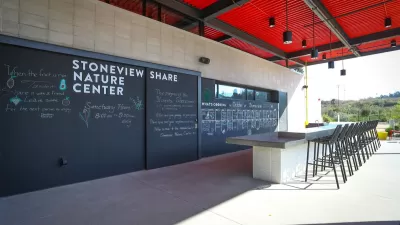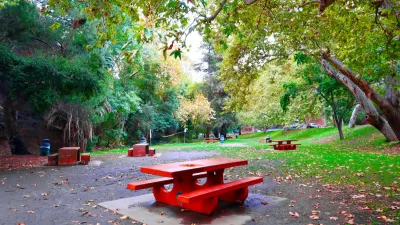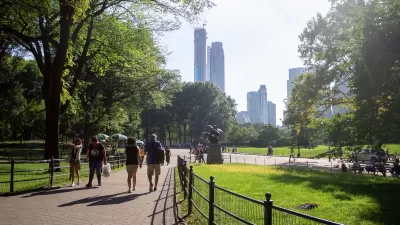City golf courses, paid for by public dollars, are rarely used by the vast majority of residents. Some advocates want to see them opened to the public as parks or repurposed for housing.

According to an article by Eliza Relman in Business Insider, “Urban and suburban golf courses are one of the least efficient and equitable ways to use densely-populated land. Many urban planners see them as a golden opportunity to address worsening homelessness, a housing affordability crisis, and a shortage of green space.”
In about half of US states, golf courses are heavily subsidized through property tax breaks. In California, a 1960 law ensures golf courses aren't taxed based on their ‘highest and best use’ as other land is, and instead get a special tax break just for being golf courses.
Compared to public parks, golf courses have much lower usage by their nature, Relman writes. In San Francisco, “The Presidio Golf Course has just 1,200 visitors per acre each year, while San Francisco's nearby Golden Gate Park welcomes 24,000 visitors per acre annually.”
With golf’s popularity on the decline—“About a third of public golf courses lost money in 2019”—“Proponents of retrofitting courses note that reducing the number of golf courses would help boost revenue for courses that do survive.”
Relman describes the challenges to converting golf courses to other uses, including the cost of buying the property and the process of rezoning to accommodate housing or other new development, which faces strong pushback in many cities. “Despite what ‘anti-golf Twitter’ says, proponents of redevelopment don't necessarily want to abolish the sport — they just want golf to take up less space in dense places.”

Alabama: Trump Terminates Settlements for Black Communities Harmed By Raw Sewage
Trump deemed the landmark civil rights agreement “illegal DEI and environmental justice policy.”

Study: Maui’s Plan to Convert Vacation Rentals to Long-Term Housing Could Cause Nearly $1 Billion Economic Loss
The plan would reduce visitor accommodation by 25% resulting in 1,900 jobs lost.

Planetizen Federal Action Tracker
A weekly monitor of how Trump’s orders and actions are impacting planners and planning in America.

Waymo Gets Permission to Map SF’s Market Street
If allowed to operate on the traffic-restricted street, Waymo’s autonomous taxis would have a leg up over ride-hailing competitors — and counter the city’s efforts to grow bike and pedestrian on the thoroughfare.

Parklet Symposium Highlights the Success of Shared Spaces
Parklets got a boost during the Covid-19 pandemic, when the concept was translated to outdoor dining programs that offered restaurants a lifeline during the shutdown.

Federal Homelessness Agency Places Entire Staff on Leave
The U.S. Interagency Council on Homelessness is the only federal agency dedicated to preventing and ending homelessness.
Urban Design for Planners 1: Software Tools
This six-course series explores essential urban design concepts using open source software and equips planners with the tools they need to participate fully in the urban design process.
Planning for Universal Design
Learn the tools for implementing Universal Design in planning regulations.
Caltrans
Smith Gee Studio
Institute for Housing and Urban Development Studies (IHS)
City of Grandview
Harvard GSD Executive Education
Toledo-Lucas County Plan Commissions
Salt Lake City
NYU Wagner Graduate School of Public Service





























